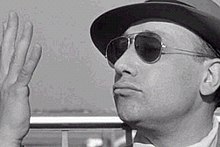
Back جان بيري ميلفلي Arabic جان بيرى ميلفلى ARZ Жан-П’ер Мельвіль Byelorussian Жан-Пиер Мелвил Bulgarian Jean-Pierre Melville Catalan Jean-Pierre Melville Czech Jean-Pierre Melville Danish Jean-Pierre Melville German Ζαν-Πιέρ Μελβίλ Greek Jean-Pierre Melville Spanish
Jean-Pierre Melville | |
|---|---|
 Melville in Breathless (1960) | |
| Born | Jean-Pierre Grumbach 20 October 1917 Paris, France |
| Died | 2 August 1973 (aged 55) Paris, France |
| Burial place | Cimetière parisien de Pantin |
| Occupations |
|
| Years active | 1946–1973 |
| Spouse | Florence Melville |
Jean-Pierre Grumbach (20 October 1917 – 2 August 1973), known professionally as Jean-Pierre Melville (French: [mɛlvil]), was a French filmmaker. Considered a spiritual godfather of the French New Wave, he was one of the first fully-independent French filmmakers to achieve commercial and critical success. His works include the crime dramas Bob le flambeur (1956), Le Doulos (1962), Le Samouraï (1967), and Le Cercle Rouge (1970), and the war films Le Silence de la mer (1949) and Army of Shadows (1969).
Melville's subject matter and approach to film making was influenced by his service in the French Resistance during World War II, during which he adopted the nom de guerre (pseudonym) 'Melville' as a tribute to his favorite American author Herman Melville.[1] He kept it as his stage name once the war was over.
His sparse, existentialist but stylish approach to film noir and later neo-noir films, many of them crime dramas, have been highly influential to future generations of filmmakers.[2] Roger Ebert appraised him as "one of the greatest directors."[3]
- ^ Breitbart, 180.
- ^ Cite error: The named reference
:1was invoked but never defined (see the help page). - ^ Ebert, Roger. "Army of Shadows movie review & film summary (1969) | Roger Ebert". rogerebert.com/. Retrieved 7 August 2023.